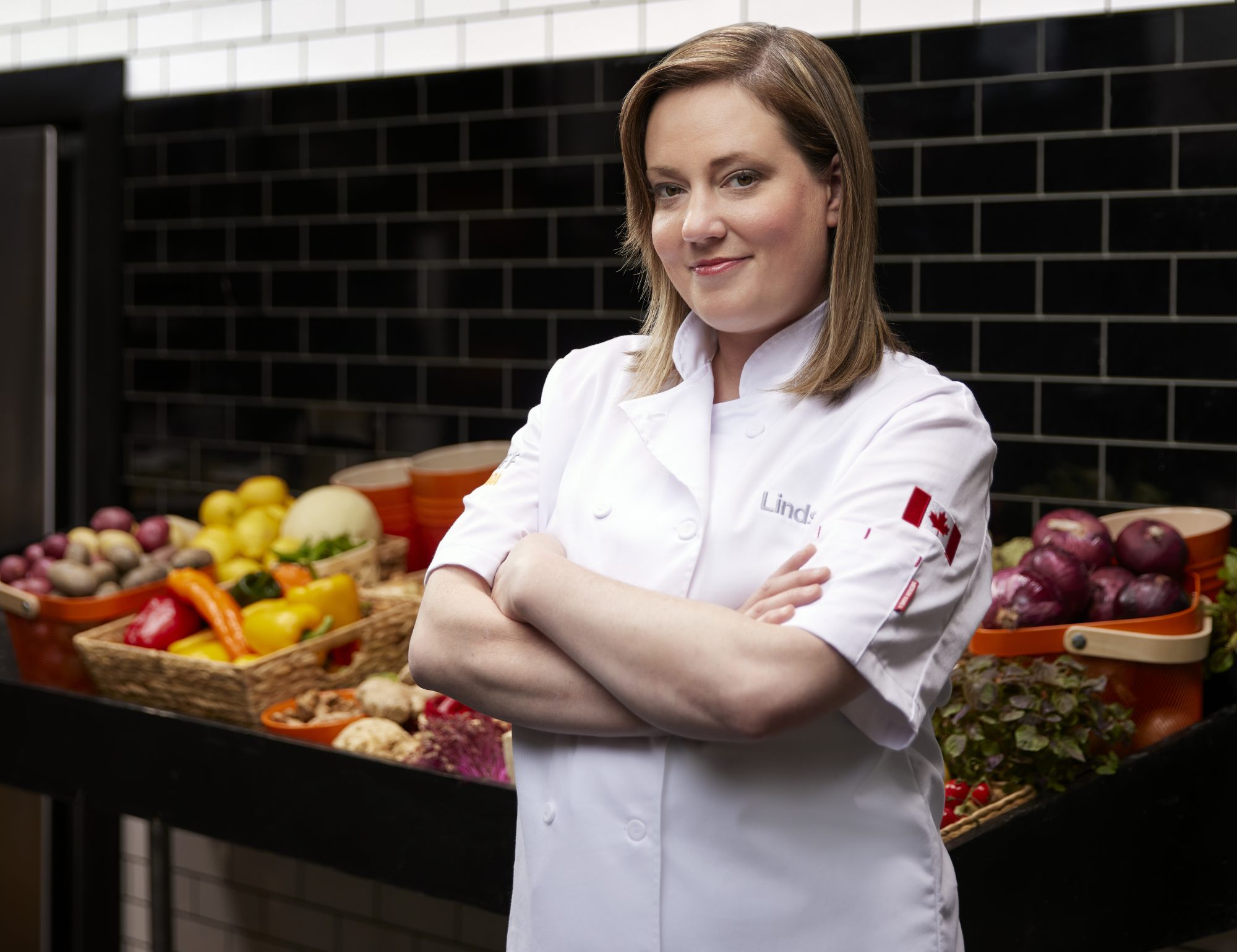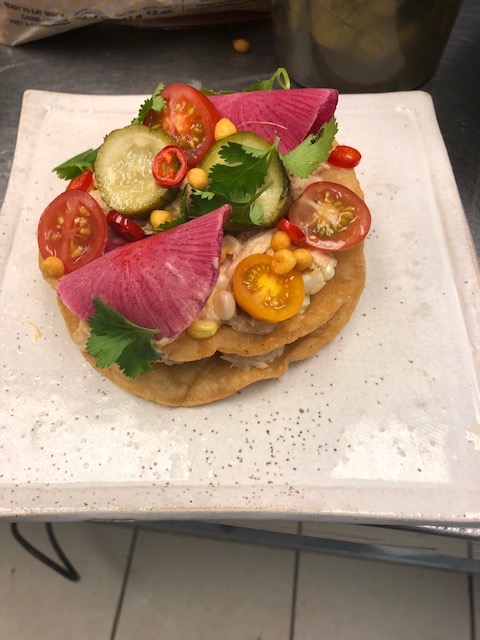
For years, cooking competition shows have asked the question: What if you gave a group of chefs a fraction of the time they normally have to cook meals, and filmed it, all while Gordon Ramsay yells at them?
The judges on Top Chef Canada aren’t screamers, but the competition is just as intense. We talked with Lindsay Porter, The Common’s chef, about competing on the show’s upcoming 10th season, the difference between kitchen and competition cooking, and the one tool she needs more than a sharp knife.
Is filming wrapped? Are you back in Edmonton?
Yup! I’m sitting on a chair at The Common. We’re actually launching a new menu pretty soon.
So you were whisked away and then had to go right back at it.
It was a whirlwind, for sure. It was probably one of the craziest things I’ve ever done. When I found out I was going, I had less than two weeks to prepare, and we were in the middle of a menu change then too. So, as a chef, you want to be around for that to make sure your ideas are executed how you envision them, but I kind of had to just do my work as best as I could for two weeks beforehand, and then say “good luck!” to my team.
And I assume they were saying the same to you.
Oh of course!
So how is the craziness of your kitchen different from the craziness of a TV kitchen set?
It’s a little bit more out of your control on the on a television show — you are thrown into these crazy competitions that aren’t in your everyday life. It’s fun. It’s exciting. But it’s definitely an adjustment. You’re very busy on set, but it’s very quickly, in little short timeframes. And then you just kind of wait around to do a lot of interviews. I always thought that as a chef, I got very little sleep, but a chef on a competition show gets even less.
Do you remember the first time that you wanted to be a chef?
I have always wanted to be a chef. I cooked a lot with my mom when I was younger, and I always wanted to know how things were made. My mom brought us to a lot of different restaurants and diners, from all kinds of different cultures, and I just really had a deep desire to learn how to make the food. It wasn’t just good enough to eat at a good restaurant, I always wanted to know how they created it. Eventually, my dad encouraged me to pursue a culinary career and I’ve been cooking ever since.

And what about the first time you wanted to be a chef competing on TV?
When you’re a young cook, you watch all these television shows, and you are inspired, and you can’t believe how they can possibly create what they’re creating in the time given. I think the first show for me was Iron Chef. And I just thought that was absolutely amazing. I had no idea how anybody could create one dish like that in four hours, let alone five dishes.
I never thought at the time that I would ever have a chance of being on any television show. But then I actually did compete on Iron Chef Canada, just as a sous chef with Shane Chartrand. So that was amazing because I was in the arena. So I would say that was kind of the first time that I really realized that, hey, this is really interesting — it’s just a different concept. It kind of opened up the door to think, down the road, I can actually apply and try and be part of the culinary TV and Food Network scenes.
Is speed the biggest difference between restaurant cooking and TV competition cooking?
Oh, 100 per cent. When you cook on a competition, you have to rely a lot more on your instincts and cook dishes that are extremely flavourful in a very short amount of time. I can come into my restaurant, cook something from 8 a.m. to 6 p.m. and braise it, develop all the flavours, cook it all down. But if you’re given 30 minutes to cook something, it’s just a different mindset. You’re always trying to think about how to extract as much flavour as I possibly can out of this 30 minutes.
So it does change in a competition. Because you can’t rely on can’t rely on braising, you can’t rely on long, slow, low-heat methods that we all learn in school, that are ingrained in us as chefs — you have to kind of just quickly pump out something that still has a real depth of flavour and something that people who are judging you want to eat.
And you kind of have to roll with the punches, too. I mean, it’s not like they just give you 30 minutes to cook something. There’s always there’s always a twist. So I go into these competitions and I try not to overthink things because anything that you are super set on can just change in a second.
So there is lots of standing in the restaurant, and lots of standing around on TV cooking competitions. For a chef who does both, are supportive shoes as important as sharp knives?
Absolutely. I would almost say my shoes are more important than my knives, at this stage of my career. Because I can make it work with a dull knife but I can’t make it with a crappy pair of shoes. You’d only get about two hours of work out of me.
From all your experience watching past seasons, were there some specific competitions that you were a bit leery of doing?
I think many of the chefs have probably been very leery about “Restaurant Wars,” where the chefs get divided into two teams and they make a menu and have to do a full restaurant service for actual guests, along with the judges. I like doing a competition by myself, because everything is a little bit more under your control. But when you have to work as a team — a brand-new team, with people you haven’t worked with before, under very stressful circumstances — it adds more stress on to the stress of just serving the people good food in the moment. So that was something that, I’ll be honest, I was kind of dreading.
Did you get to know any of the other chefs?
Yeah, they were a wonderful group of people. As much as it’s perceived as a cutthroat competition, I would say in my experience, talking and spending time with the other chefs was probably the most calming part of the entire competition. Meeting and learning from them, and talking about food during our off time was fantastic. My only regret is I didn’t get to try as much food as I wished because everyone is cooking at such a high calibre.
And now that you’re back at The Common, how did the menu change in your absence go?
I have a great team here. The Common is extremely established and great — the management and the great cooks in the back — so they killed it. They did awesome. We reduced the menu a little bit, so it wasn’t so overwhelming. And I think now that I’m back and I can kind of start to put a lot more time in, we’re going to take on kind of a small menu that we had and expand on it and make something really nice for the people here in Edmonton.
Crab Tostada Salad – Chef Lindsay Porter
Mix together the crab, chipotle, mayonnaise, chopped cilantro, chopped thai basil, corn, cumin and lemon and lime together to make a crab mixed salad.
Fry two corn tortillas or brush with oil and bake in the oven until crispy.
Thinly slice tomato, radish, gooseberry, cucumber and pepper.
Place crab on one tostada, garnish with herbs and sliced vegetables, and stack a second tostada on top and garnish with picked herbs and sliced veg.
Like this content? Get more delivered right to your inbox with Ed. Eats
A list of what’s delicious, delectable and delightful.







